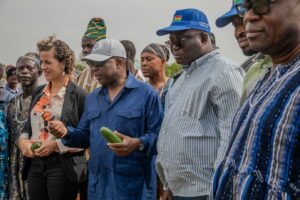
In the busy streets of Accra, a young executive assistant enters a local waakye spot. Instead of paying immediately, she enters a code and chooses Credit, a Buy-Now-Pay-Later (BNPL) plan. The cost? Around 40 Ghana cedis, divided over four weeks. It’s a small amount for a simple meal. Yet, in that moment, we catch a glimpse of a quiet revolution reshaping urban life in Ghana.
BNPL is now woven into everyday life. It’s no longer just for smartphones or cars; it’s financing school uniforms, groceries, and even basic health treatments. This shift is steadily changing the pace of city living and has given rise to non-banking credit and loan institutions.
Admittedly, I run a microfinance enterprise myself, although I am not promoting it as much as my other businesses, yet (www.WellMaxCredit.com). So, believe me when I tell you, the moment people hear an interest rate twice the national GRR, it’s already a yes.
Globally, the BNPL industry is expected to surpass US $560 billion in 2025 (FinTech Futures, 2025). In Africa, the model’s appeal is clear: low barriers to entry, mobile-first interfaces, and a generation increasingly comfortable with digital finance (Mastercard BNPL in Africa Report, 2024). However, with opportunity comes risk, and the stakes for African cities are uniquely high.
Why BNPL is booming in African cities
Three forces are driving the BNPL surge across the continent.
Smartphone penetration
Affordable devices and mobile internet have given millions access to digital marketplaces where BNPL is baked into checkout processes (Mastercard BNPL in Africa Report, 2024).
Informal economies
A large share of urban workers operate outside formal banking systems. BNPL offers them flexible, low-friction access to goods and services (McKinsey Informal Economy Trends Report, 2024).
Cultural aspirations
Rising urban populations, fuelled by a young demographic, are eager to access modern lifestyles, and BNPL makes aspirational spending feel attainable.
Companies are tailoring BNPL models for local realities, targeting everything from laptops to fertiliser. Yet, beneath this innovation lies an uncomfortable truth: when we have to access our basic essential purchases through financing, it is a sign that the social fabric is under significant stress.
The danger of normalising debt for survival
Historically, credit served as a lever for investment, like financing a house, an education, or a business. Today, BNPL is increasingly used for essential spending: meals, work shoes, and utility bills.
This shift is subtle but profound. It risks creating a new class of “credit-dependent citizens” whose monthly budgets are built on fragmented, deferred obligations.
In Accra, informal surveys estimate that up to 30% of BNPL users have at least three concurrent instalment plans (McKinsey Informal Economy Trends Report, 2024). Many rotate repayments to stay afloat, effectively juggling micro-debts to maintain a semblance of normalcy.
Without careful regulation and financial education, this could spiral into systemic fragility. I have discussed this with the Micro-Credit Association of Ghana. There is strong interest in exploring nationwide frameworks for responsible BNPL lending and linking it to broader financial inclusion goals.
BNPL’s impact on urban resilience
Why does this matter beyond individual households? It’s because financially vulnerable citizens weaken the economic resilience of entire cities. This erosion manifests in multiple, interconnected ways that quietly but decisively destabilise the foundations of urban life.
Lower household savings
When instalments consistently eat into future income, families are left with little or no capacity to absorb financial shocks. This leaves them vulnerable to emergencies and everyday fluctuations: a rise in food prices, a sick child, or a delayed salary. Over time, this erodes intergenerational wealth as parents struggle to save for their children’s education or invest in long-term goals.
Weaker consumer confidence
In an environment where BNPL obligations already fragment disposable income, consumer spending becomes reactive rather than strategic. People buy only what they need immediately, often in smaller quantities, which reduces bulk purchases and negatively impacts overall business margins. This volatility makes it more challenging for SMEs to forecast demand, manage inventory, or access credit effectively.
Higher mental health burdens
The emotional toll of juggling repayments, dodging defaults, and living under constant financial uncertainty is severe. Persistent financial anxiety is closely linked to depression, low self-worth, and in some cases, substance dependency (World Health Organization, 2024). As stress compounds, it can affect productivity at work, relationships at home, and even physical health.
Reduced civic engagement
Citizens trapped in a cycle of economic survival have reduced time and energy for community life, whether it’s volunteering, attending town meetings, or participating in local initiatives. This undermines social cohesion and trust, both of which are essential for stable, resilient urban environments.
Urban fragility doesn’t begin with crumbling roads or traffic congestion. It begins with individuals forced to navigate daily life without the essential cushion of financial security.
Cities flourish when people can plan, invest, and dream. Unchecked BNPL dependency transforms ambition into anxiety and undermines the fundamental concept of sustainable urban development.
Policy interventions: Building healthy credit ecosystems
BNPL is not inherently bad. It can be a powerful tool for inclusion if managed wisely. However, like any powerful tool, it requires guardrails, feedback loops, and a deep understanding of how it interacts with vulnerable communities. African regulators, FinTechs, civic leaders, and even educators must collaborate to shape an ecosystem that balances access with protection.
Cap effective interest rates
Some BNPL models mask high fees as “service charges.” These add up quickly, especially when users carry multiple loans. Transparency must be enforced. Clear legal definitions should distinguish between service fees and disguised interest. Policymakers should mandate disclosure of the total cost of credit, perhaps in local languages, using examples that reflect everyday purchases.
Mandate plain-language contracts
Contracts must be readable at a secondary school level and structured so that the most critical terms (interest rate, penalties, duration) appear upfront. A consumer should not need a lawyer to understand a loan agreement. Regulators might also explore using iconography and simplified “credit scorecards” so customers can compare offers like they do prepaid bundles.
Integrate repayment data into credit bureaus
A well-managed BNPL repayment history can serve as a pathway to more meaningful credit. However, this only functions if the data is reported to national or regional bureaus. In areas where digital IDs are lacking, partnerships with telecom companies could provide alternative identities to begin establishing financial reputations. This system must also incorporate safeguards: a missed payment should not automatically damage a user’s score.
Promote ‘Earn-Save-Spend-Later’ platforms
Instead of conditioning users to borrow for everything, FinTechs could be incentivised to reward users who save. Government-backed programmes might match savings or offer tiered access to credit based on healthy financial habits. These platforms could use typical elements of gamification (visual trackers, rewards, community savings milestones) to integrate long-term thinking into daily habits.
Launch public financial literacy campaigns
Just as public health campaigns have taught millions how to wash hands or manage hypertension, public debt education can impart skills in budgeting, interest calculation, and responsible borrowing. Schools, churches, market associations, radio hosts, and social media influencers all play a crucial role. In Ghana, for instance, financial literacy can be integrated into civic education and entrepreneurship training at the SHS and tertiary levels.
Policy isn’t just paperwork. It’s a way of shaping the financial imagination of a generation. And if we don’t intervene now, we risk normalising debt as the default way to live.
Cultural Shifts: Redefining Dignity Beyond Consumption
I could write a whole new article about this.
There is also a deeper cultural task. Cities must help redefine what it means to “make it.” True dignity should not be measured by how many goods one can access instantly, but by stability, growth, and meaningful contributions to the community.
This means celebrating different markers of success. For example, a young person consistently saving for a land plot or starting a modest poultry farm deserves as much praise as someone showing off a new phone bought on credit. Community leaders, traditional authorities, and public figures can all set the tone. We need to publicly affirm patience, prudence, and persistence, not just the speed of acquisition.
Community events can help reinforce this shift. Instead of merely celebrating material donations or flashy displays at festivals, why not honour the town’s top youth savers and most impactful community organisers? Or recognise those who complete financial literacy training or repay a small business loan without default? Imagine what signal this will send to everyone else in the community. Churches and mosques can bless savings boxes and cooperative plans just as they bless new cars and new houses in the many videos we see on social media.
Media also has a critical role. Storylines in popular TV shows and telenovelas could weave in characters who grow their wealth gradually and thoughtfully through cooperative savings, smart budgeting, or honest entrepreneurship. Influencers could make planning aspirational, showing followers not just what they bought but how they planned and saved for it. A Ghanaian YouTuber showcasing the process of building a house room-by-room might inspire more stability than another imported shopping haul. I believe Kojo Sheldon did something similar, opening his journey of building his home to his audience.
We have to be honest: the current consumer culture rewards speed, not sustainability. But culture isn’t static. It evolves. With intention, cities can champion a narrative where credit is seen as a stepping stone, not a status symbol.
In doing so, we will start to build urban economies not only with roads and bridges, but also with values that endure.
Closing thoughts
BNPL, like credit itself, is neither good nor bad; it’s a mirror. It reflects the values, structures, and conditions of the society that adopts it.
If we build ecosystems that equip citizens with information, regulation, dignity, and alternatives, credit becomes a bridge, to opportunity, to resilience, to better livelihoods.
But if left unchecked, credit morphs into a quiet and deeply corrosive trap. It feeds short-term survival while hollowing out long-term growth. It expands inclusion on paper while multiplying anxiety on the ground.
We are not powerless. Ghana can model a different kind of credit culture, one that sees value in patience, one that treats transparency as infrastructure, and one that teaches citizens that access is not the same as empowerment.
#Nowherecool, but somewhere ought to be cool. And for that to happen, our financial systems must be warm, designed with empathy, built with intention, and rooted in shared progress.
The future isn’t just about credit; it’s about trust across the board.
I hope you found this article both insightful and enjoyable. Your feedback is greatly valued and appreciated. I welcome any suggestions for topics you would like me to cover or provide insights on. You can schedule a meeting with me through my Calendly at www.calendly.com/maxwellampong. Alternatively, connect with me through various channels on my Linktree page at www.linktr.ee/themax. Subscribe to the ‘Entrepreneur In You’newsletter here: https://lnkd.in/d-hgCVPy.
If you want to explore this subject matter more thoroughly, I have compiled a list of reading materials and references that provide greater detail and focus on particular areas.
FinTech Futures, Buy Now Pay Later Global Business Report 2025 (25 March 2025) https://www.fintechfutures.com/press-releases/buy-now-pay-later-global-business-report-2025 accessed 23 April 2025
Mastercard, BNPL in Africa: Emerging Trends and Insights 2024 (Mastercard Insights Africa 2024)
McKinsey & Company, Informal Economy Trends in Sub-Saharan Africa 2024 (McKinsey Global Institute 2024)
World Health Organization, Financial Stress and Mental Health: A Global Perspective (WHO Data Brief 2024) https://www.who.int/health-topics/mental-health accessed 23 April 2025
I wish you a highly productive and successful week ahead!
? —- ? —- ? —- ? —- ?

The author, Dr. Maxwell Ampong, serves as the CEO of Maxwell Investments Group. He is also an Honorary Curator at the Ghana National Museum and the Official Business Advisor with Ghana’s largest agricultural trade union under Ghana’s Trade Union Congress (TUC). Founder of WellMax Inclusive Insurance and WellMax Micro-Credit, Dr. Ampong writes on relevant economic topics and provides general perspective pieces. ‘Entrepreneur In You’ operates under the auspices of the Africa School of Entrepreneurship, an initiative of Maxwell Investments Group.
Disclaimer: The views, thoughts, and opinions expressed in this article are solely those of the author, Dr. Maxwell Ampong, and do not necessarily reflect the official policy, position, or beliefs of Maxwell Investments Group or any of its affiliates. Any references to policy or regulation reflect the author’s interpretation and are not intended to represent the formal stance of Maxwell Investments Group. This content is provided for informational purposes only and does not constitute legal, financial, or investment advice. Readers should seek independent advice before making any decisions based on this material. Maxwell Investments Group assumes no responsibility or liability for any errors or omissions in the content or for any actions taken based on the information provided.
The post Credit as a BRIDGE, not a TRAP. appeared first on The Business & Financial Times.
Read Full Story






Facebook
Twitter
Pinterest
Instagram
Google+
YouTube
LinkedIn
RSS